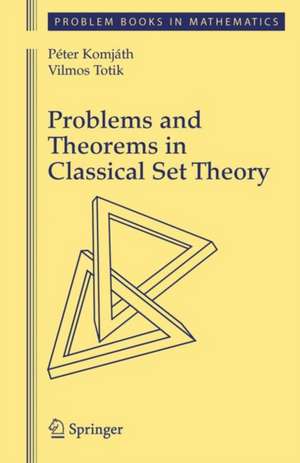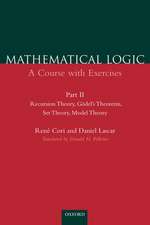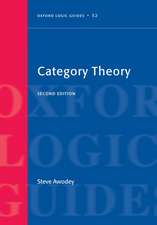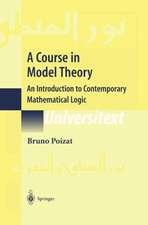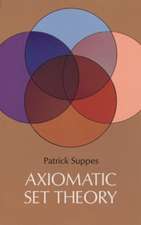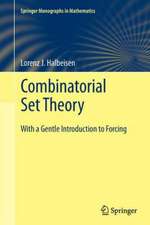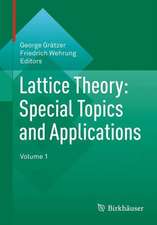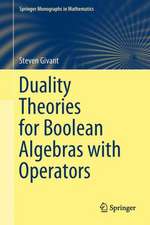Problems and Theorems in Classical Set Theory: Problem Books in Mathematics
Autor Peter Komjath, Vilmos Totiken Limba Engleză Hardback – 2 mai 2006
| Toate formatele și edițiile | Preț | Express |
|---|---|---|
| Paperback (1) | 401.24 lei 43-57 zile | |
| Springer – 24 noi 2010 | 401.24 lei 43-57 zile | |
| Hardback (1) | 487.55 lei 43-57 zile | |
| Springer – 2 mai 2006 | 487.55 lei 43-57 zile |
Din seria Problem Books in Mathematics
- 15%
 Preț: 362.20 lei
Preț: 362.20 lei - 13%
 Preț: 363.89 lei
Preț: 363.89 lei - 17%
 Preț: 361.89 lei
Preț: 361.89 lei - 15%
 Preț: 538.44 lei
Preț: 538.44 lei - 23%
 Preț: 637.98 lei
Preț: 637.98 lei -
 Preț: 403.79 lei
Preț: 403.79 lei -
 Preț: 361.55 lei
Preț: 361.55 lei - 17%
 Preț: 368.60 lei
Preț: 368.60 lei -
 Preț: 501.78 lei
Preț: 501.78 lei - 17%
 Preț: 433.52 lei
Preț: 433.52 lei - 17%
 Preț: 495.23 lei
Preț: 495.23 lei - 15%
 Preț: 651.30 lei
Preț: 651.30 lei -
 Preț: 414.42 lei
Preț: 414.42 lei -
 Preț: 380.25 lei
Preț: 380.25 lei - 15%
 Preț: 521.09 lei
Preț: 521.09 lei -
 Preț: 447.41 lei
Preț: 447.41 lei - 15%
 Preț: 645.60 lei
Preț: 645.60 lei - 18%
 Preț: 962.81 lei
Preț: 962.81 lei - 15%
 Preț: 478.71 lei
Preț: 478.71 lei - 19%
 Preț: 462.65 lei
Preț: 462.65 lei -
 Preț: 413.37 lei
Preț: 413.37 lei -
 Preț: 458.19 lei
Preț: 458.19 lei - 15%
 Preț: 650.86 lei
Preț: 650.86 lei - 15%
 Preț: 582.12 lei
Preț: 582.12 lei - 15%
 Preț: 580.68 lei
Preț: 580.68 lei - 15%
 Preț: 696.96 lei
Preț: 696.96 lei - 15%
 Preț: 512.67 lei
Preț: 512.67 lei - 15%
 Preț: 536.31 lei
Preț: 536.31 lei -
 Preț: 393.35 lei
Preț: 393.35 lei - 15%
 Preț: 644.63 lei
Preț: 644.63 lei -
 Preț: 386.22 lei
Preț: 386.22 lei - 15%
 Preț: 639.08 lei
Preț: 639.08 lei - 15%
 Preț: 674.42 lei
Preț: 674.42 lei - 15%
 Preț: 476.45 lei
Preț: 476.45 lei - 15%
 Preț: 651.02 lei
Preț: 651.02 lei - 15%
 Preț: 609.96 lei
Preț: 609.96 lei -
 Preț: 345.06 lei
Preț: 345.06 lei - 15%
 Preț: 706.16 lei
Preț: 706.16 lei -
 Preț: 384.86 lei
Preț: 384.86 lei -
 Preț: 379.86 lei
Preț: 379.86 lei -
 Preț: 965.95 lei
Preț: 965.95 lei - 20%
 Preț: 443.79 lei
Preț: 443.79 lei
Preț: 487.55 lei
Preț vechi: 573.58 lei
-15% Nou
Puncte Express: 731
Preț estimativ în valută:
93.29€ • 97.65$ • 77.65£
93.29€ • 97.65$ • 77.65£
Carte tipărită la comandă
Livrare economică 31 martie-14 aprilie
Preluare comenzi: 021 569.72.76
Specificații
ISBN-13: 9780387302935
ISBN-10: 038730293X
Pagini: 514
Ilustrații: XII, 516 p.
Dimensiuni: 156 x 235 x 29 mm
Greutate: 0.88 kg
Ediția:2006
Editura: Springer
Colecția Springer
Seria Problem Books in Mathematics
Locul publicării:New York, NY, United States
ISBN-10: 038730293X
Pagini: 514
Ilustrații: XII, 516 p.
Dimensiuni: 156 x 235 x 29 mm
Greutate: 0.88 kg
Ediția:2006
Editura: Springer
Colecția Springer
Seria Problem Books in Mathematics
Locul publicării:New York, NY, United States
Public țintă
GraduateCuprins
Problems.- Operations on sets.- Countability.- Equivalence.- Continuum.- Sets of reals and real functions.- Ordered sets.- Order types.- Ordinals.- Ordinal arithmetic.- Cardinals.- Partially ordered sets.- Transfinite enumeration.- Euclidean spaces.- Zorn’s lemma.- Hamel bases.- The continuum hypothesis.- Ultrafilters on ?.- Families of sets.- The Banach-Tarski paradox.- Stationary sets in ?1.- Stationary sets in larger cardinals.- Canonical functions.- Infinite graphs.- Partition relations.- ?-systems.- Set mappings.- Trees.- The measure problem.- Stationary sets in [?]^- The Banach-Tarski paradox.- Stationary sets in ?1.- Stationary sets in larger cardinals.- Canonical functions.- Infinite graphs.- Partition relations.- ?-systems.- Set mappings.- Trees.- The measure problem.- Stationary sets in [?]^
Recenzii
From the reviews:
"The volume contains 1007 problems in (mostly combinatorial) set theory. As indicated by the authors, "most of classical set theory is covered, classical in the sense that independence methods are not used, but classical also in the sense that most results come from the period, say, 1920--1970. Many problems are also related to other fields of mathematics such as algebra, combinatorics, topology and real analysis." And indeed the topics covered include applications of Zorn's lemma, Euclidean spaces, Hamel bases, the Banach-Tarski paradox and the measure problem. The statement of the problems, which are distributed among 31 chapters, takes 132 pages, and the (fairly detailed) solutions (together with some references) another 357 pages. Some problems are elementary but most of them are challenging. For example, in Chapter 29 the reader is asked in Problem 1 to show that $[\lambda]^{^Baumgartner's result that every closed unbounded subset of $[\omega_2]^{^leph_1}$ is of maximal cardinality $\aleph_2^{\aleph_0}$. This is a welcome addition to the literature, which should be useful to students and researchers alike." (Pierre Matet, Mathematical Reviews)
"The book is well written and self contained, a choice collection of hundreds of tastefully selected problems related to classical set theory, a wealth of naturally arising, simply formulated problems … . It is certainly available to students of mathematics major even in their undergraduate years. The solutions contain the right amount of details for the targeted readership. … This is a unique book, an excellent source to review the fundamentals of classical set theory, learn new tricks, discover more and more on the field." (Tamás Erdélyi, Journal of Approximation Theory, 2008)
"The volume contains 1007 problems in (mostly combinatorial) set theory. As indicated by the authors, "most of classical set theory is covered, classical in the sense that independence methods are not used, but classical also in the sense that most results come from the period, say, 1920--1970. Many problems are also related to other fields of mathematics such as algebra, combinatorics, topology and real analysis." And indeed the topics covered include applications of Zorn's lemma, Euclidean spaces, Hamel bases, the Banach-Tarski paradox and the measure problem. The statement of the problems, which are distributed among 31 chapters, takes 132 pages, and the (fairly detailed) solutions (together with some references) another 357 pages. Some problems are elementary but most of them are challenging. For example, in Chapter 29 the reader is asked in Problem 1 to show that $[\lambda]^{^Baumgartner's result that every closed unbounded subset of $[\omega_2]^{^leph_1}$ is of maximal cardinality $\aleph_2^{\aleph_0}$. This is a welcome addition to the literature, which should be useful to students and researchers alike." (Pierre Matet, Mathematical Reviews)
"The book is well written and self contained, a choice collection of hundreds of tastefully selected problems related to classical set theory, a wealth of naturally arising, simply formulated problems … . It is certainly available to students of mathematics major even in their undergraduate years. The solutions contain the right amount of details for the targeted readership. … This is a unique book, an excellent source to review the fundamentals of classical set theory, learn new tricks, discover more and more on the field." (Tamás Erdélyi, Journal of Approximation Theory, 2008)
Textul de pe ultima copertă
This is the first comprehensive collection of problems in set theory. Most of classical set theory is covered, classical in the sense that independence methods are not used, but classical also in the sense that most results come from the period between 1920-1970. Many problems are also related to other fields of mathematics such as algebra, combinatorics, topology and real analysis. The authors choose not to concentrate on the axiomatic framework, although some aspects are elaborated (axiom of foundation and the axiom of choice). Rather than using drill exercises, most problems are challenging and require work, wit, and inspiration. The problems are organized in a way that earlier problems help in the solution of later ones. For many problems, the authors trace the origin and provide proper references at the end of the solution.
The book follows a tradition of Hungarian mathematics started with Pólya-Szegõ's problem book in analysis and continued withLovász' problem book in combinatorics. This is destined to become a classic, and will be an important resource for students and researchers.
Péter Komjáth is a professor of mathematics at the Eötvös Lóránd University, Budapest. Vilmos Totik is a professor of mathematics at the University of South Florida, Tampa and University of Szeged.
The book follows a tradition of Hungarian mathematics started with Pólya-Szegõ's problem book in analysis and continued withLovász' problem book in combinatorics. This is destined to become a classic, and will be an important resource for students and researchers.
Péter Komjáth is a professor of mathematics at the Eötvös Lóránd University, Budapest. Vilmos Totik is a professor of mathematics at the University of South Florida, Tampa and University of Szeged.
Caracteristici
Well chosen sequences of exercises leading to the proofs of basic results of different special topics Collects the classical results of set theory as developed after the discovery of modern axiomatic methods
